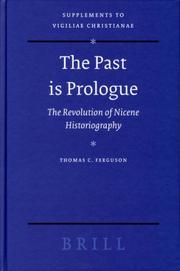| Listing 1 - 1 of 1 |
Sort by
|

ISSN: 0920623X ISBN: 9004144579 9789004144576 9781429453479 1429453478 143370577X 9781433705779 128086835X 9786610868353 9047407830 Year: 2005 Volume: 75 Publisher: Leiden ; Boston : Brill,
Abstract | Keywords | Export | Availability | Bookmark
 Loading...
Loading...Choose an application
- Reference Manager
- EndNote
- RefWorks (Direct export to RefWorks)
While there has been substantial scholarly work done on the development of Christian doctrine in the fourth and fifth centuries, very little corresponding attention has been paid to the writing of church history during this critical period. This work examines how authors began to construct the historical narrative of the “Arian” controversy and focuses on the interplay between theology and worshipping communities. Major figures such as Eusebius and Athanasius are examined, and important but overlooked figures such as an anonymous non-Nicene chronicler and Philostorgius are also included. In the introduction the book surveys recent developments in the study of “Arianism” and discusses the usefulness of the very category of an “Arian controversy.” Subsequent chapters set forth the thesis that church histories are important sources for understanding the development of doctrine. A chapter is devoted to Eusebius’ Ecclesiastical History, especially the oft-overlooked Book X. Further chapters explore the role of Rufinus as the first extant author to write a continuation of Eusebius. The work also consciously includes marginalized non-Nicene sources, and there are chapters which examine an anonymous non-Nicene chronicler and the Ecclesiastical History of the Eunomian Philostorgius of Borissus. The book is particularly useful for persons interested in examining the development of doctrine in the fourth century from fresh perspectives. The work approaches church histories as narrative myths of community origins produced by worshipping communities standing in continuity to local schools of thought.
Theology, Doctrinal --- Heresies, Christian --- Church history --- History --- Historiography. --- Christian heresies --- Théologie dogmatique --- Hérésies chrétiennes --- Eglise --- Historiography --- Histoire --- Historiographie --- Primitive and early church, ca. 30-600 A.D. --- Heresies and heretics --- Heresy --- Christian sects --- Christian doctrines --- Christianity --- Doctrinal theology --- Doctrines, Christian --- Dogmatic theology --- Fundamental theology --- Systematic theology --- Theology, Dogmatic --- Theology, Systematic --- Theology --- Doctrines --- Theology, Doctrinal - History - Early church, ca. 30-600 - Historiography. --- Heresies, Christian - History - Early church, ca. 30-600 - Historiography. --- Church history - Primitive and early church, ca. 30-600 - Historiography.
| Listing 1 - 1 of 1 |
Sort by
|

 Search
Search Feedback
Feedback About
About Help
Help News
News